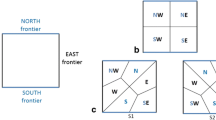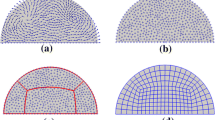Summary
In this paper, we present a novel hexagon-based mesh generation method which creates all-quadrilateral (all-quad) meshes with guaranteed angle bounds and feature preservation for arbitrary planar domains. Given any planar curves, an adaptive hexagon-tree structure is constructed by using the curvature of the boundaries and narrow regions. Then a buffer zone and a hexagonal core mesh are created by removing elements outside or around the boundary. To guarantee the mesh quality, boundary edges of the core mesh are adjusted to improve their formed angles facing the boundary, and two layers of quad elements are inserted in the buffer zone. For any curve with sharp features, a corresponding smooth curve is firstly constructed and meshed, and then another layer of elements is inserted to match the smooth curve with the original one. It is proved that for any planar smooth curve all the element angles are within [60°-ε, 120°+ε] (ε ≤ 5°). We also prove that the scaled Jacobians defined by two edge vectors are in the range of [sin(60°-ε), sin90°], or [0.82, 1.0]. Furthermore, the same angle range can be guaranteed for curves with sharp features, with the exception of small angles in the input curve. In addition, all the elements in the final mesh are grouped into five types, and most elements only need a few flops to construct the stiffness matrix for finite element analysis. This will significantly reduce the computational time and the required memory during the stiffness matrix construction. We have applied our algorithm to a set of complicated geometries, including the Lake Superior map, and a three-component air foil with sharp features.
Access this chapter
Tax calculation will be finalised at checkout
Purchases are for personal use only
Preview
Unable to display preview. Download preview PDF.
Similar content being viewed by others
References
Atalay, F.B., Ramaswami, S.: Quadrilateral meshes with bounded minimum angle. In: 17th Int. Meshing Roundtable, pp. 73–91 (2008)
Baehmann, P.L., Wittchen, S.L., Shephard, M.S., Grice, K.R., Yerry, M.A.: Robust geometrically based, automatic two-dimensional mesh generation. Int. J. Numer. Meth. Eng. 24(6), 1043–1078 (1987)
Baker, T.J.: Identification and preservation of surface features. In: 13th Int. Meshing Roundtable, pp. 299–309 (2004)
Bern, M., Eppstein, D.: Quadrilateral meshing by circle packing. Int. J. Comp. Geom. & Appl. 10(4), 347–360 (2000)
Bishop, C.J.: Quadrilateral meshes with no small angles (1991) (manuscript) , http://www.math.sunysb.edu/~bishop/papers/quadmesh.ps
Blacker, T.D., Stephenson, M.B.: Paving: A new approach to automated quadrilateral mesh generation. Int. J. Numer. Meth. Eng. 32(4), 811–847 (1991)
Brewer, M., Diachin, L., Knupp, P.M., Leurent, T., Melander, D.: The Mesquite mesh quality improvement toolkit. In: 12th Int. Meshing Roundtable, pp. 239–250 (2003)
Canann, S.A., Tristano, J.R., Staten, M.L.: An approach to combined laplacian and optimization-based smoothing for triangular, quadrilateral, and quad-dominant meshes. In: 7th Int. Meshing Roundtable, pp. 211–224 (1998)
Garimella, R.V., Shashkov, M.J., Knupp, P.M.: Triangular and quadrilateral surface mesh quality optimization using local parametrization. Comp. Meth. Appl. Mech. Engr. 193(9–11), 913–928 (2004)
Kinney, P.: CleanUp: Improving quadrilateral finite element meshes. In: 6th Int. Meshing Roundtable, pp. 437–447 (1997)
Liang, X., Ebeida, M., Zhang, Y.: Guaranteed-quality all-quadrilateral mesh generation with feature preservation. Comp. Meth. Appl. Mech. Engr. 199(29–32), 2072–2083 (2010)
Mitchell, S.A., Tautges, T.J.: Pillowing doublets: Refining a mesh to ensure that faces share at most one edge. In: 4th Int. Meshing Roundtable, pp. 231–240 (1995)
Owen, S.: A survey of unstructured mesh generation technology. In: 7th Int. Meshing Roundtable, pp. 26–28 (1998)
Qian, J., Zhang, Y., Wang, W., Lewis, A.C., Qidwai, M.A.S., Geltmacher, A.B.: Quality improvement of non-manifold hexahedral meshes for critical feature determination of microstructure materials. Int. J. Numer. Meth. Eng. 82(11), 1406–1423 (2010)
Quadros, W.R., Ramaswami, K., Prinz, F.B., Gurumoorthy, B.: LayTracks: A new approach to automated geometry adaptive quadrilateral mesh generaton using medial axis transform. Int. J. Numer. Meth. Eng. 61, 209–237 (2004)
Schneiders, R., Schindler, R., Weiler, F.: Octree-based generation of hexahedral element meshes. In: 5th Int. Meshing Roundtable, pp. 205–216 (1996)
Sußner, G., Dachsbacher, C., Greiner, G.: Hexagonal LOD for interactive terrain rendering. In: Vision Modeling and Visualization, pp. 437–444 (2005)
Sußner, G., Greiner, G.: Hexagonal Delaunay triangulation. In: 18th Int. Meshing Roundtable, pp. 519–538 (2009)
Tam, T., Armstrong, C.G.: 2D finite element mesh generation by medial axis subdivision. Adv. Eng. Software 13(5–6), 313–324 (1991)
White, D.R., Kinney, P.: Redesign of the paving algorithm: Robustness enhancements through element by element meshing. In: 6th Int. Meshing Roundtable, pp. 323–335 (1997)
Zhang, Y., Bajaj, C.: Adaptive and quality quadrilateral/hexahedral meshing from volumetric Data. Comput. Meth. Appl. Mech. Eng. 195(9–12), 942–960 (2006)
Zhang, Y., Bajaj, C., Sohn, B.-S.: 3D finite element meshing from imaging data. Comput. Meth. Appl. Mech. Eng. 194(48–49), 5083–5106 (2005)
Zhang, Y., Bajaj, C., Xu, G.: Surface smoothing and quality improvement of quadrilateral/hexahedral meshes with geometric flow. Commun. Numer. Meth. Eng. 25(1), 1–18 (2009)
Zhang, Y., Hughes, T., Bajaj, C.: An automatic 3D mesh generation method for domains with multiple materials. Comput. Meth. Appl. Mech. Eng. 199(5–8), 405–415 (2010)
Zhu, J.Z., Zienkiewicz, O.C., Hinton, E., Wu, J.: A new approach to the development of automatic quadrilateral mesh generation. Int. J. Numer. Meth. Eng. 32(4), 849–866 (1991)
Author information
Authors and Affiliations
Editor information
Editors and Affiliations
Rights and permissions
Copyright information
© 2010 Springer-Verlag Berlin Heidelberg
About this paper
Cite this paper
Liang, X., Zhang, Y. (2010). Hexagon-Based All-Quadrilateral Mesh Generation with Guaranteed Angle Bounds. In: Shontz, S. (eds) Proceedings of the 19th International Meshing Roundtable. Springer, Berlin, Heidelberg. https://doi.org/10.1007/978-3-642-15414-0_1
Download citation
DOI: https://doi.org/10.1007/978-3-642-15414-0_1
Publisher Name: Springer, Berlin, Heidelberg
Print ISBN: 978-3-642-15413-3
Online ISBN: 978-3-642-15414-0
eBook Packages: EngineeringEngineering (R0)




